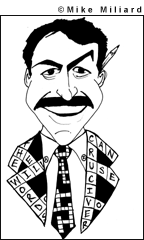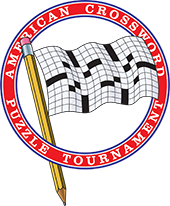Enigmatologically Cruciverbalistic
Source: The Phoenix.comDate: March 7-14, 2002
Byline: Chris Wright
Enigmatologically Cruciverbalistic
Word perfect Will Shortz is a born cruciverbalist. He has been making crosswords since he was eight years old. At 14, he sold his first puzzle. In college, Shortz earned a degree in enigmatology — the study of puzzles — a decision he says raised eyebrows in his family. But the degree paid off; since 1993, Shortz has been crossword editor at the New York Times, a position he calls "the best job in the world."
Will Shortz is a born cruciverbalist. He has been making crosswords since he was eight years old. At 14, he sold his first puzzle. In college, Shortz earned a degree in enigmatology — the study of puzzles — a decision he says raised eyebrows in his family. But the degree paid off; since 1993, Shortz has been crossword editor at the New York Times, a position he calls "the best job in the world."
From March 15 through 17, Shortz will be in Stamford, Connecticut, to host the American Crossword Puzzle Tournament, an event he founded in 1978. He spoke with the Phoenix from his home in New York.
Q: Why do you have such a passion for crosswords?
A: I love words. I love crosswords because they take you into every field of human knowledge — everything in the world can show up in a puzzle. I like the playfulness of crosswords, how they twist your mind.
Q: Do you ever suffer from constructor's block?
A: Sometimes a puzzle will fight you down to that last corner, and you just can't make the words match — that's the time you either put it aside for later or beat your head against a wall.
Q: Do you ever get nasty mail?
A: I used to get a lot when I first started, because my style is different from my predecessor's, but not too often now. Of course, there are people who take issue with clues, who think there must be some mistake. There used to be a crossword maker at the Times named Doris Nash Wortman. She had a pillow that someone had needle-stitched with the words I HATE DORIS NASH WORTMAN.
Q: You interviewed Bill Clinton — is he a good solver?
A: He is a terrific solver. Another editor and I at Games magazine took a puzzle to him. As I interviewed him, he sat and solved the crossword — a Wednesday puzzle — in six minutes 54 seconds. So he was quite sharp.
Q: What are the skills needed to be a good solver?
A: I think the most important thing is flexibility of mind. You have to see all the different meanings. A clue that says "lead" [verb] can be "lead" [noun]. There's all sorts of trickery and deception involved. It helps to have a good vocabulary, a knowledge of all sorts of subjects.
Q: How would you describe the atmosphere at your crossword tournaments?
A: Most people go to test themselves — you can be the best in the train car, but this is your one chance to find out how good you really are. But it's surprisingly lighthearted. Of course, during the tournament there's tension.
Q: Are there ever tears?
A: I remember one person who got really angry one year, a person who was emotionally unstable, who said she was going to go and do something to her boyfriend, I think. We never heard from her again.
Q: Do the crowds get worked up?
A: The event is announced like a sporting event — it is hysterical to listen to. So the crowd is laughing at that. Once the event is over, they cheer for the winner. Last year's winner had finished in the top five for 18 consecutive tournaments without winning. So when she won, the place just went crazy, there was an explosion of joy.
Q: Is there such a thing as a crossword addict?
A: Yes — you're talking to one. Sometimes someone will send me a book for a blurb, and if I like the book I'll do puzzle after puzzle after puzzle. Unlike most addictions, crosswords are good for you. Of course, it's possible to take anything too far.
Q: Are you as good at doing crosswords as you are at making them?
A: I'm pretty good, but I would not be a winner at the tournament — puzzle-making and puzzle-solving are two different skills.
Q: Here's a clue: "filled with hot air," nine letters.
A: Bombastic.
Q: No, it was "flatulent."
A: That's cute. That one I'll never use. We have all sorts of great clues that will never see print.

